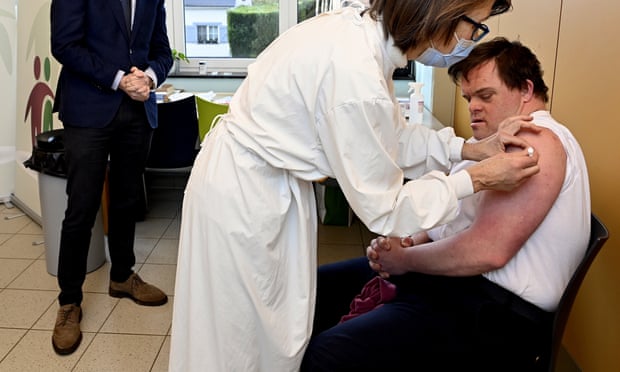Compare and contrast. AstraZeneca is currently producing Covid vaccines for no profit and still manages to get beaten up by opportunists in Brussels. Over in the US, Moderna is hailed as a national saviour while shouting from the rooftops about how its commercial prospects have been transformed by its own Covid vaccine.
Moderna’s full-year statement on Thursday was extraordinary. The company expects to generate revenues of $18.4bn (£13.1bn) year from deals it has signed to supply its vaccine, which is priced at $30–$36 a shot, so is definitely intended to produce a chunky profit margin. That revenue forecast is enormous. For comparison, AstraZeneca’s entire established portfolio – for cancer, cardiovascular, respiratory treatments and more – generated sales of $26.6bn last year.
The backstories to the vaccines are very different, of course. Moderna was a loss-making biotechnology firm that has poured billions into developing messenger RNA technology (also used in the BioNtech/Pfizer product) and a successful return on that investment was never guaranteed. AstraZeneca has merely accelerated original research done at Oxford University – and a condition of the partnership was “at cost” pricing for all the deals to date.
There is a consolation for AstraZeneca in that it backed Moderna in its early years and now owns a stake in the company worth roughly $5bn. All the same, the contrasting rewards from combating the pandemic hardly seem fair. AstraZeneca may be able to switch to commercial pricing for higher-income countries eventually, but its only gain so far has been goodwill, although not from all in the EU. In a (still) undersupplied Covid vaccine market in 2021, Moderna can expect to make an absolute mint.
Centrica’s disgruntled shareholders have one reason to be cheerful
“Significant uncertainties” remain at Centrica, the owner of British Gas, says its chief executive, Chris O’Shea, and he didn’t just mean the industrial dispute over so-called “fire and rehire” contracts. A turnaround “won’t be easy” and, though he’s confident it will happen, he’s not saying when – “the coming years”.
With vagueness on this scale, you can understand why the shares slid 3%. British Gas lost more customers in 2020, albeit less rapidly than usual, and the timing of the two big disposals – the Spirit Energy upstream production business and the stake in the nuclear generator British Energy – are anybody’s guess.
There is, though, one comfort for Centrica’s long-suffering shareholders. O’Shea is the first chief executive in years who sounds serious about making the business simpler and more competitive with the independents. He still has to make peace with the unions, but his predecessors seemed to think Centrica was some form of protected national energy champion. That illusion has now gone, thankfully.
Indignation over Serco’s ‘Covid windfall’ is misplaced
Criticism over the NHS test-and-trace programme confirmed Serco’s place in popular corporate infamy, so the nation probably won’t rise to applaud the first dividend for shareholders since 2014. Fair enough. But one can also feel a smidgeon of sympathy for Rupert Soames, the chief executive, as he tried to deflect the idea that the distribution is some sort of Covid windfall. It’s definitely not that.
First, Covid has been only slightly better than neutral for Serco. The test-and-trace work brought in revenues of £350m in 2020, which, at a 4% margin, generated operating profits of £14m. But, on the other side of the ledger, the company says contracts to run leisure centres and suchlike evaporated. The net gain was a mere £2m.
Second, Serco has repaid its Covid support in the UK. Axing dividends a year ago, amid the initial financial confusion created by the pandemic, was the correct approach, but the exit from support schemes is roughly the moment when dividend life should be allowed to resume.
In any case, the cash cost of Serco’s dividend is £17m – hardly a bonanza for a company that was rescued, in effect, by the infusion of £850m from investors since 2014. Indignation is better directed at the miscreants on business rates: those retailers who kept their relief even as their stores were open and trading strongly.
Is it nearing game over for GameStop’s investor frenzy?
The second incarnation of the GameStop saga is even more baffling than the first. To recap: the share price doubled on Wednesday and kept going in early US trading on Thursday, even though fair value for the video games retailer is a lot lower, according to almost every independent analyst.
Since the short-selling hedge funds are now off the pitch, the latest larks can’t be explained by a technical short squeeze. Rather, it seems to be a case of buyers piling in just because the share price rose again. Some will have made money, of course. But surely everybody now knows what’s coming next.
Source: Read Full Article

